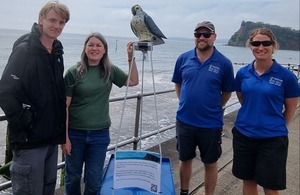RoboBird sent to protect Teignmouth’s bathing water
A robotic bird of prey is being used to stop seagulls contaminating Teignmouth’s bathing water.

Environment Agency and Teignmouth Council officers with the Robobird
Bird poo is one important factor which can affect water quality. To deter wildfowl from polluting sites used by bathers, the Environment Agency and Teignbridge Council have deployed a new agent nicknamed ‘RoboBird’.
Modelled after the peregrine falcon, the ‘peregrinator’ mimics a natural predator and will perch on Teignmouth promenade throughout the bathing water season. This will help reduce impact from this source on the bathing water, allowing the agency to focus on other known issues.
Jonathan Harvey, an Environment Agency environmental monitoring officer, said: “We’ll gauge the effectiveness of the RoboBird through water quality sampling around the pier. We have also planned more conventional approaches for enhancing Teignmouth’s bathing water quality this season, including investigations into drainage systems and potential misconnections.”
Teignbridge Council has done bird counts around the bathing water sampling point, before and after the deployment of the RoboBird so its impact on wildfowl populations can be monitored.
Resort manager Sarah Holgate said: “As we unveil this exciting initiative, we also urge responsible environmental practices. Avoid pouring waste oil into drains or sewers, as it poses a threat to our beaches.”
Name suggestions for the RoboBird are also wanted. You can find video of it in action on the regional Environment Agency’s X channel and share your suggestions using #EArobobird.
The Environment Agency’s bathing water season began last week and sampling of bathing waters will be carried out regularly until the end of September. Anyone fancying a dip is encouraged to check out Swimfo where they can see the classification of the water quality, the latest sample result and if there are any pollution risk forecasts in effect.
Last year, 96% of bathing waters in England met minimum standards and 90% of bathing waters in England were rated as ‘good’ or ‘excellent’, up from 76% in 2010, despite the classification standards becoming stricter in 2015. The government also updated its guidance last year to make the application process clearer and easier to follow.
Designated bathing waters are specifically managed to achieve water quality standards presumed to be protective of health which is not the case for other water bodies that the public may choose to swim in. To reduce risk from bathing waters, the UK Health Security Agency and Environment Agency also offer advice in their ‘swim healthy’ guidance which is available to read before making any decision on swimming.